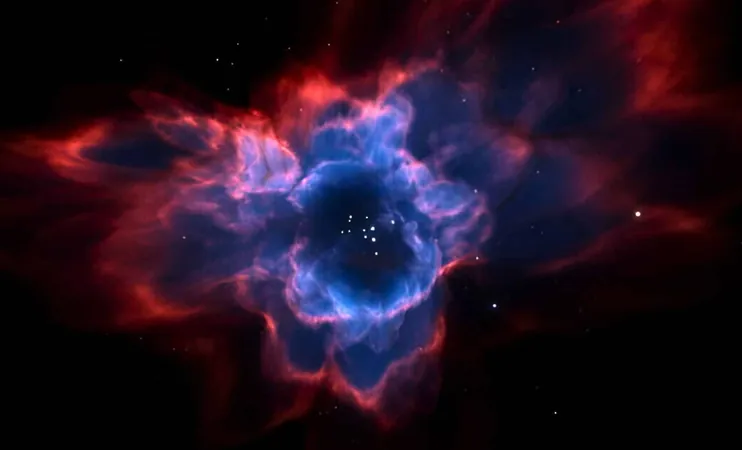
Scientists Challenge the Existence of Dark Energy: A 'Lumpy' Universe May Hold the Key to Cosmic Expansion
2024-12-24
Author: Ming
A Revolutionary Perspective on Cosmic Dynamics
Historically, cosmologists have relied on the Lambda Cold Dark Matter (ΛCDM) model, which posits dark energy as an essential component to account for the acceleration of cosmic expansion identified through observations of distant supernovae. However, this approach makes the crucial assumption that the universe expands uniformly—a hypothesis increasingly at odds with emerging evidence, including the notorious Hubble tension. This discrepancy highlights a significant difference in the expansion rates observed in the early universe compared to those measured today.
The researchers have introduced a new framework called the "timescape model," which reconsiders our understanding of time and space across the universe. By suggesting that the observed acceleration can be attributed to local variations in gravitational fields rather than a uniform dark energy component, the timescape model removes the necessity for dark energy altogether. Professor David Wiltshire, the study's lead author, argues that the observed discrepancies in cosmic expansion rates are likely the result of these local variations rather than a misinterpretation of the universe's dynamic behavior.
How Does the Timescape Model Contrast With Traditional Assumptions?
The exploration of the timescape model reveals notable differences when compared to the ΛCDM framework. One of the most significant aspects is the introduction of gravitational time dilation. In regions of strong gravitational influence, such as inside galaxies, time elapses more slowly than in less dense cosmic voids. This crucial factor implies that the perceived acceleration of the universe may stem from differences in the relativistic effects of time rather than from an actual force pushing the universe apart.
According to the researchers, “a clock located in the Milky Way would run at a pace approximately 35 percent slower compared to a clock in a large empty void.” Thus, rather than depicting dark energy as an external force, their model proposes that it's a misinterpretation driven by the unevenness of cosmic landscapes.
New Horizons in Cosmology: The Implications of the Timescape Model
The implications of this alternative model are significant, potentially shifting the foundations of modern cosmology. As Professor Wiltshire notes, "Dark energy may simply be a misidentification stemming from localized kinetic energy variations within our lumpy universe." He emphasizes that this approach could provide answers to longstanding issues, including the Hubble tension.
Furthermore, evidence from sophisticated observational tools like the Dark Energy Spectroscopic Instrument (DESI) supports the idea that alternative models could offer a more accurate representation of cosmic behaviors than traditional models. As observational technology evolves, scientific instruments such as the European Space Agency’s Euclid satellite and the upcoming Nancy Grace Roman Space Telescope may yield vital data that can further test the timescape model against the ΛCDM framework.
What's Next for Cosmic Exploration?
To truly validate the timescape model, the scientific community requires a substantial catalog of high-quality observations, with projections indicating at least 1,000 additional supernovae are necessary to distinguish the models clearly. With anticipated new data, the mystery of the universe’s expansion could be resolved within the next decade.
As researchers continue to challenge conventional thinking regarding our universe, the ongoing discourse surrounding dark energy not only raises questions about its existence but also promises to redefine our fundamental understanding of the cosmos. Buckle up, as the journey to unlock the secrets of the universe is just beginning—this could reshape everything we thought we knew!


 Brasil (PT)
Brasil (PT)
 Canada (EN)
Canada (EN)
 Chile (ES)
Chile (ES)
 España (ES)
España (ES)
 France (FR)
France (FR)
 Hong Kong (EN)
Hong Kong (EN)
 Italia (IT)
Italia (IT)
 日本 (JA)
日本 (JA)
 Magyarország (HU)
Magyarország (HU)
 Norge (NO)
Norge (NO)
 Polska (PL)
Polska (PL)
 Schweiz (DE)
Schweiz (DE)
 Singapore (EN)
Singapore (EN)
 Sverige (SV)
Sverige (SV)
 Suomi (FI)
Suomi (FI)
 Türkiye (TR)
Türkiye (TR)